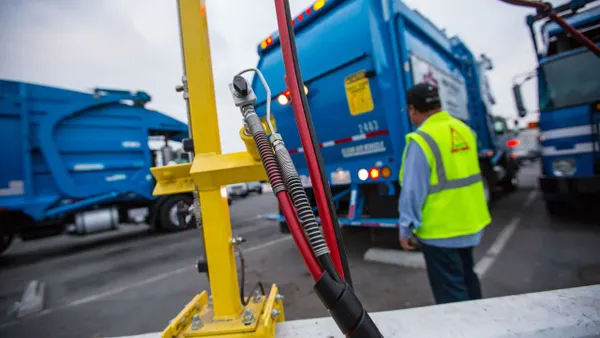Dive Brief:
- Environmental Protection Agency Administrator Scott Pruitt visited Disney World early this week to highlight the park's commitment to sustainability, as reported by The Wall Street Journal.
- The Disney anaerobic digester, built and operated by Harvest Power, can process 120,000 tons of food waste annually. Pruitt spent time touring a greenhouse facility and a restaurant kitchen in the Magic Kingdom to observe Disney's food sustainability practices.
- An executive from Harvest Power told Pruitt that the company was "eager" to build more facilities, but said the $30 million price tag can be "prohibitive" for companies and municipalities.
Dive Insight:
During Pruitt's January confirmation process, he said he was "not familiar" with many waste issues. And, while much of Pruitt's tenure so far has been defined by his "back to basics" approach on reducing regulations, he has not ignored the waste sector since coming on board.
The administrator has spent a significant amount of time talking about Superfund sites, and said that the EPA would create a "top 10" list of priority sites for cleanup. While the agency has proposed volume cuts to required volume under the Renewable Fuel Standard — a move that biogas producers have pushed back on — he's also pledged to not cut those volumes any further.
Pruitt's EPA has been less engaged on landfill emissions rules, however. A 90-day stay on Obama-era rules expired in late August, and the agency went months without offering any sort of public clarification. In late October, the agency said states that don't submit plans under the Emissions Guidelines rules would not be "subject to sanctions."
Many in the industry have wondered what all of this would mean for the EPA's goal of cutting food waste 50% by 2030. Based on continuing webinars and events on the subject, this may be one of the few Obama programs that Pruitt is willing to leave untouched. Though unlike Obama, President Donald Trump's America Recycles Day proclamation didn't include any mention of food waste this year, and the administration has backed away from making connections between organics and greenhouse gas emissions.
Pruitt's focus on voluntary measures — like Disney generating energy from food scraps — aligns with his interest in market-driven solutions over regulatory action. Though as Harvest Power executives mentioned during the tour, it's often still expensive to develop the necessary processing capacity for certain material streams. Voluntary measures are useful, but it's unclear if they can achieve the broader goals that many in the business community have begun to accept when it comes to topics such as food waste.









